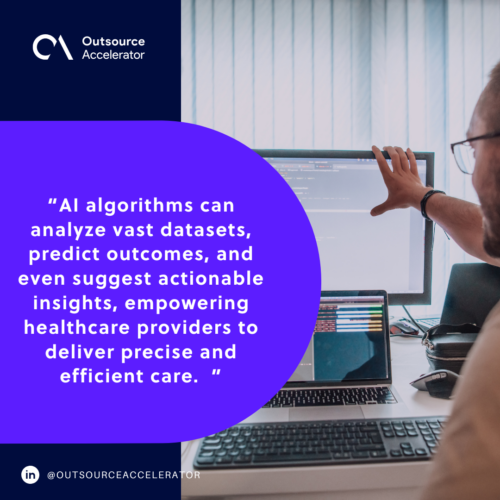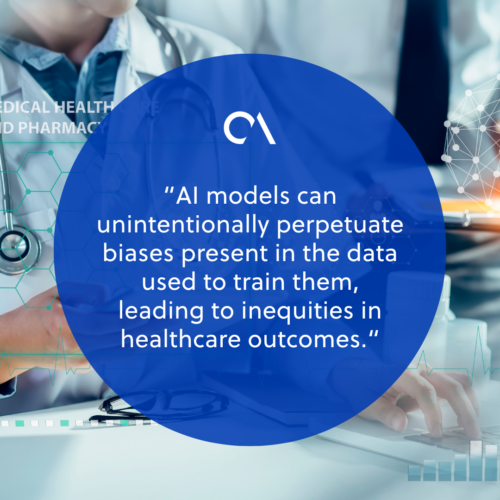The impact of AI in healthcare software development

Artificial Intelligence (AI) was once considered an element of a futuristic setting. But the technology is here now, and it’s set to make waves in the healthcare industry.
AI in healthcare is reshaping how providers deliver services, from precision diagnostics to personalized treatment plans.
The integration of AI into custom software development is especially pivotal. It enables the creation of tailored solutions to address the unique needs of healthcare organizations.
In the 524th episode of the Outsource Accelerator Podcast, Tatsiana Kirimava from Orangesoft shares her excitement for the advent of AI solutions in healthcare.
This article delves into the transformative role of AI in healthcare software, exploring its benefits, challenges, and future potential.
Custom software development in healthcare
Custom software development has become a cornerstone of the modern healthcare ecosystem. Unlike off-the-shelf solutions, custom healthcare software is designed to meet specific requirements, which ensures seamless integration and addresses distinct challenges.
In healthcare, custom software solutions often manage electronic health records (EHRs), streamline patient scheduling, and support telemedicine platforms. With the infusion of AI in healthcare, these solutions are becoming smarter and more adaptable.
Precedence Research notes that the global generative AI in healthcare market size is expected to be worth around USD 39.70 billion by 2034, highlighting its growing use.
For her part, Tatsiana is open-minded, saying “We can’t say no to these technologies. AI is already here and we have to figure out how we can use it safely.”
AI algorithms can analyze vast datasets, predict outcomes, and even suggest actionable insights, empowering healthcare providers to deliver precise and efficient care.

For example, a hospital’s custom AI-powered software can detect patterns in patient data, flagging potential health risks before symptoms escalate.
AI also enhances interoperability—a key challenge in healthcare technology.
Custom software can bridge gaps between different systems, ensuring smooth data exchange and improving collaboration across departments. This adaptability not only streamlines operations but also sets the stage for innovative patient care.
5 Benefits of AI in healthcare software development
Tatsiana and Orangesoft welcome AI integration. As she puts it, “I’m in love with all the AI solutions we have on the market right now, and I’m really excited how we can bring all this value to the healthcare area.”
Here are five benefits of AI in healthcare:
1. Enhanced diagnostic accuracy
AI-driven software is proving invaluable in diagnosing conditions more accurately and efficiently. Machine learning models can analyze medical imaging data to detect anomalies, such as tumors, with greater precision than traditional methods.
For instance, AI algorithms used in radiology have significantly improved the early detection rates of diseases like breast cancer, saving countless lives.
Tatsiana sees this as a logical step-up in data, saying that “For many years we’ve been collecting such a huge amount of data, but we had no chance to analyze it the right way.”
2. Personalized treatment plans
By analyzing patient data, AI enables the creation of highly personalized treatment plans. Predictive analytics can assess how individual patients are likely to respond to specific therapies, allowing doctors to tailor interventions accordingly.
Custom software incorporating AI can also recommend lifestyle adjustments to prevent chronic illnesses, enhancing patient outcomes.
3. Operational efficiency
AI reduces the administrative burden on healthcare providers by automating routine tasks. From scheduling appointments to managing billing processes, custom software with AI capabilities minimizes human error and frees up staff to focus on patient care.
Chatbots integrated into hospital websites, for example, can handle inquiries and provide immediate assistance, improving patient satisfaction.
4. Improved drug development
AI accelerates drug discovery and development by simulating how new compounds will interact with the human body. As a result, the time and cost associated with clinical trials are greatly reduced.
Custom AI platforms for pharmaceutical companies can optimize research processes, enabling quicker breakthroughs in treatments for complex diseases.
5. Real-time monitoring and alerts
AI-powered wearable devices and monitoring systems collect real-time data on patients’ health metrics. Custom software processes this data to provide actionable alerts to healthcare providers, ensuring timely interventions.
For example, an AI-driven platform can notify a doctor if a patient’s heart rate or blood pressure exceeds safe levels, enabling immediate action.
Tatsiana points out this speed as a great benefit.
“For healthcare it’s extremely important because we [get] all the time to make a decision about our patient based on the data.
Challenges and concerns of using AI in healthcare
As the technology is so new, there can be some concerns when implementing it. Take note of these when adding AI into your healthcare processes:
Data privacy and security
Healthcare data is highly sensitive, and AI applications often require large datasets to function effectively. This creates vulnerabilities, as breaches in data security can expose patients’ private information.
Developers of custom AI healthcare software must prioritize robust encryption protocols and comply with regulations such as HIPAA and GDPR to mitigate risks.
Integration with legacy systems
Many healthcare organizations rely on outdated systems that lack compatibility with modern AI technologies. Integrating AI into these legacy systems can be costly and complex.
Custom software development helps bridge this gap, but the process requires careful planning to avoid operational disruptions.
Bias and ethical concerns
AI models can unintentionally perpetuate biases present in the data used to train them, leading to inequities in healthcare outcomes. For example, an AI diagnostic tool trained on datasets lacking diversity may be less effective for certain demographics.
Developers must ensure that training datasets are inclusive and algorithms are regularly audited to prevent biased decision-making.
Tatsiana is aware of these, noting that they provide a strong case for human workers to remain involved.
“We still have to operate [alongside] AI. We have to think of the full infrastructure. We still have to think about the security.”

The future of AI in healthcare software development
The future of AI in healthcare software development is brimming with potential. Emerging technologies like generative AI are expected to redefine how healthcare data is processed and utilized.
Another promising avenue is the integration of AI with wearable technology. Advanced monitoring systems equipped with AI will not only track vital signs but also predict medical emergencies before they occur.
Custom software solutions will play a critical role in harnessing this data for predictive healthcare, enabling providers to act proactively.
As AI technology continues to evolve, the emphasis will be on creating ethical, transparent, and secure software solutions. Custom software development will remain at the forefront of this evolution, bridging the gap between innovation and practical application in the healthcare sector.
Tatsiana thinks that AI will continue to assist us in the future as the tech evolves.
“We have to learn faster than ever before, and we have to change ourselves faster than ever before… And I truly believe that it is for a better future.”







 Independent
Independent




